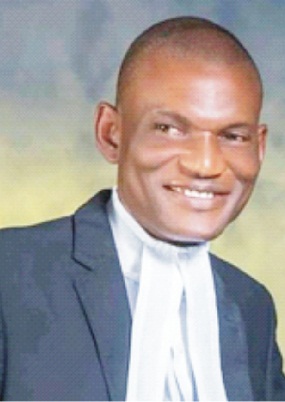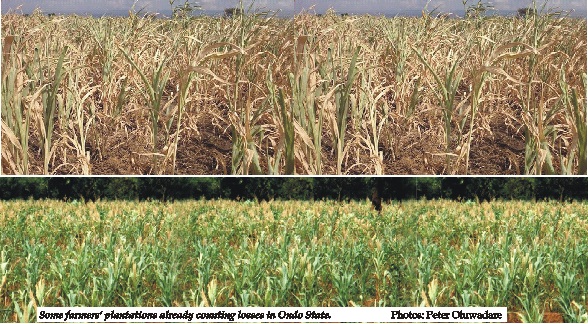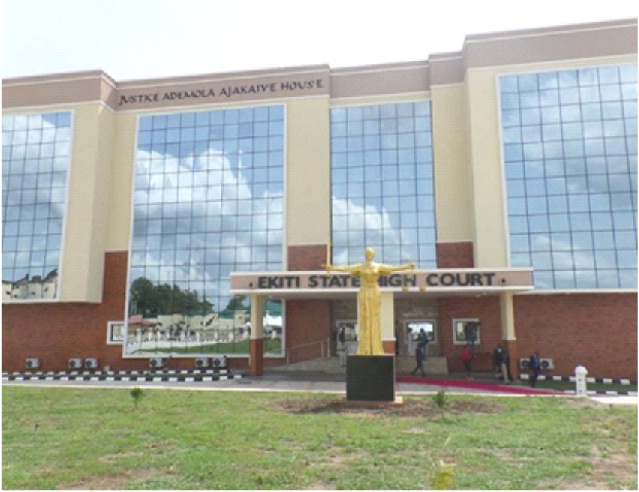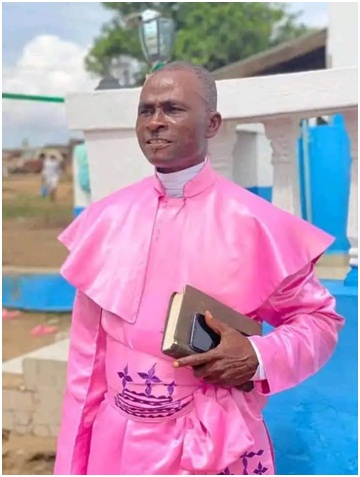Reactions trail Supreme Court judgement on old naira
By Bamidele Kolawole
|
Supreme Court (SC) is the apex, highest and the last Court in Nigeria, established by the statute of law, it is expressly stated in Section 230 of the 1999 Constitution of the Federal Republic of Nigeria as amended, whatever decision or judgement is given by the Supreme Court cannot be appealed, only the SC can correct herself, it is called the Supreme because it is superior and senior to any other court in the land.

The Supreme Court is the highest Court in Nigeria by the express provisions of section 235 of the Constitution (1999 Constitution of the Federal Republic of Nigeria, as amended). The Court has the exclusive constitutional power to ‘have original jurisdiction in any dispute between the Federation and a state or between states if and in so far as that dispute involves any question (whether of law or fact) on which the existence or extent of a legal right depends’. (See section 232 of the Constitution).
Once the Supreme Court has made a pronouncement on any matter, the decision of the Court on such matter is final as ‘no appeal shall lie to any other body or person from any determination of the Supreme Court’. See section 235 of the Constitution.
Now coming to the Supreme Court ruling on the Naira swap and weekly limits placed on withdrawal by Banks’ customers, the Supreme Court was called upon to exercises and apply its judicial review powers and prerogative to determine the legality and suitability of the policies crammed into the ‘Naira Swap’ philosophy by the Central Bank.
Meanwhile, one of the Supreme Court’s most important powers is the power represents by the legal concept known as ‘judicial review’, or the ability of the Court to declare a Legislative or Executive act in violation of the Constitution.
One of the most important decisions of the Court in the case at hand was the fact that there is no law that limits the amount of money customers can withdraw from their accounts daily, weekly or monthly for such restrictions violate the civil rights of the citizens.
Thus, the Court played a role in protecting the civil rights and liberties of citizens by striking down the draconic policies of the Central Bank/president Buhari that was obviously venting violence on Nigerians and violently violate the Constitution of Nigeria.
At the core of the decisions of the Court is that the new naira design policy initiated by the Federal Government unlawful on the grounds that it was not done with due consultation with the appropriate bodies and in line with constitutional provisions.
The fact that the decisions of the Supreme Court in this matter was widely accepted by the masses shows that the Court remains the last resort of the common man.
Hence, with due respect to the defendants in the case, the arguments conversed before the Court touching on jurisdiction of the Court were misplaced efforts knowing the legal fact that the Court has finally moved from the era of technical justice to the havens of substantial justice.
In the final analysis, the decisions of the Court in the suit challenging the Naira swaps and incidental policies of the Central Bank has become a big relief for Nigerians and State Governments that challenged the ‘heartless’ policies.

In my view, the Supreme Court as the last hope of the common man, has swooped in when called upon by the three courageous states that first filed the Motion, I strongly commend the governors for stepping up to their duty and protecting the constitutional rights of the people.
The CBN in exercising powers conferred on it encroached upon constitutional rights and the Supreme Court rightly corrected the error. Reasonable notice for the currency swap was deemed to have equally not been given in the policy.
The ruling is commendable and well received as evidenced by the demeanor of the general populace, it is just unfortunate what the people had to go through especially during festivities on the back of the policy. It is a beautifully thought out ruling with regards to the issues raised.
On a side note however, though poorly executed, the policy should be looked at again, as the intent and the technicality of its execution are at odds.

Until 1991,the Central Bank of Nigeria, the last resort of money tender, was tied to the apron of the Federal Ministry of Finance, however under the leadership of Gen.IBB(RTD) through the Legal instruments of 2 different decrees removed the Apex bank from the shackles of Federal ministry of Finance, thus Empowered the CBN to be the sole adviser of the Federal Government on money matters, including money market regulatory Policies.
It may though, appears that the CBN erred with the introduction of the “cashless economy” Policy, I don’t quite think so, given the fact that the rate of inflation in the Nigerian Economy was indefinable by any means, so the Policy was long expected, however the timing is killing. As per the pronouncement of the Supreme Court of Nigeria on the money swap, I am of the opinion that Law must always have human face, which is what the Apex Court of the land did. The Court came in to safe the already tensed situation.
It must be remembered that, the Supreme Court remains the interpreter of all laws, even Policies which could be classified under statute, as variety of law, so the Supreme Court cannot be said to be a meddlesome interloper.
The most unfortunate thing here is the fact that the Supreme Court cannot stop or force the CBN to comply,simply because, every single old naira note that finds it way to the CBN will not return alive and that cannot be qualified as disobedience to the Court, simply because, the apex bank would have acted in line with its operational rules, part of which is to weed-off “BAD” Naira Notes by stopping same from circulation and burn it off.
The Supreme Court Judgment in my opinion is a big saving grace to the teaming Nigerian masses who were already crumbling under the heavy yoke of the almighty CBN, even though, the life-span of the judgment is going to be very short, lasting till the last old (BAD) naira n ote returns to the CBN vault for proper treatment, in the meantime however, we all can shout hurray!!!

The controversial monetary policy being challenged at the Supreme Court had last year introduced newly redesigned 200, N500, and N1,000 notes with tight deadline to mop up the old notes from circulation.
The policy has led to scarcity of currency notes, bringing untold hardship to millions of citizens in an economy significantly driven by the informal sector with a large proportion of unbanked persons.
A 31st January deadline initially set for ending the legal tender status of the old notes was extended to 10 February as the supply of the new notes fell far short of the volume needed by citizens to meet their most basic needs across the country.
On 3 February, three statement governments – Kaduna, Kogi, and Zamfara – citing the hardships the continued scarcity of naira notes brought to their people, sued the federal government at the Supreme Court for a reversal of the policy.
Five days later, the court issued an interim order suspending the implementation of the deadline set by the federal government, and directed that the old and new notes should continue to circulate pending the resolution of the case.
Unmoved by the court’s order, the CBN insisted that the old notes had stopped being legal tender after the 8 February deadline while the scarcity of the new notes persisted. In defiance to the Supreme Court’s order, President Buhari on 16th February, restored the validity of the old N200 notes, insisted that the N500 and N1000 notes had ceased to be legal tender.
At the resumed hearing of the suit on 22 February, the number of plaintiffs rose to 16 after six new states were added to the three initial plaintiffs. The matter was set for ruling on both the preliminary objection filed by the defendants and the substantive suit.
In the notice of preliminary objection filed, the following grounds were set out; 1: That the Supreme Court lacks jurisdiction to hear the suit
2:That the case does not fall within the original jurisdiction of the Supreme Court.
3: That the Official Secret Act stipulates that a suit should be maintained against a public officer within
three months, and
4: The matter is statute barred and speculative.
The Court respectfully submits that the dispute is between the states and the government of the Federation the dispute is within the original jurisdiction of the court. The argument that it is the CBN was the proper party to be sued is invalid. It is not the action of the CBN that is being challenged. See
Supreme Court Additional Jurisdiction, 2003.
In the light of the above, I respectfully align with the reasoning and submissions of the learned Justices of the Supreme Court and so submit that their ruling was just and in the interest of justice.

According to the CBN Governor, Mr Godwin Emefiele, the naira redesign policy is to enable CBN to manage inflation, control money in circulation and to also curtail incidence of ransom payment.
It is no longer news that the implementation of the CBN’s naira swap policy has in the past few months brought untold hardships to Nigerians.
This was confirmed by the President in the last media broadcast and also admitted by the CBN Governor in his interview with the Press.
It has hampered economic and trading activities in the country resulting to increase in standard of living and high-cost goods and services. Many, including the National Assembly, finance minister, Nigerian Bar Association, some State Governors have kicked against the monetary policy implementation.
While the intent of the CBN may be right but the implementation seems rather too harsh given the short deadline announced by the CBN.
However, the recent decision of the Supreme Court seems to be a huge relief to so many Nigerians particularly Nigerians who still have the old naira.
Recall that prior to the final judgment delivered on Friday, a most recent interim order of the Supreme Court of Nigeria against the Central Bank of Nigeria restraining the Bank from going ahead with its deadline for the end use of old naira note was disobeyed.
In the most recent judgment, the Supreme Court gave her ratio decided which were the key factual reasons that were considered for the final judgment.
The court in its decision considered what constitute reasonable notice in accordance with Section 20(3) CBN ACT, it emphasized on due consultations with the appropriate bodies and authorities concerned and not some media broadcast. Similarly, the order given by the supreme court was upturned in a media broadcast by the president, this ought not to be.
It is expected that the same federal government coming before the court in the suit wherein judgement was delivered on Friday will come with clean hands, unspotted and without blemish but this was not the case.
He who comes to equity must come with clean hands. Disobedience to court orders and judgment weakens the respect for rule of law.
In my opinion, the CBN ought to have given reasonable time for the withdrawal of the old naira from circulation. The new currency should be made available while they gradually withdraw the old currency from circulation.
The recent decision of the court affords ample time to get the old naira out of circulation and its very possible to get it out even before December, 2023 which is the latest deadline.

First and foremost, I must state that the Supreme Court Judgment on naira swap delivered on Friday, March 3, 2023 is a commendable one which would stand the test of time. In effect, I concur in to with all the findings of the apex court.
On the issue of non-joinder of CBN as a necessary party, it is my submission that the court rightly held that the CBN is not a necessary party in the case because it is an agency of the Federal Government, which was sued through the AGF.
This is reinforced by the general principle of the law of agency which states that “the agent of a disclosed principal need not sue or be sued” This principle of course originated from the common law principle which states that “qui facit per allium, facit perse, a sam facere indepur (translated to mean he who acts or does an act through another, is deemed in law to do the act himself) and this principle has been enunciated in plethora of cases vis a vis: Fairline Pharmaceutical Industry Ltd & Anor v Trust Adjusters Nig. Ltd (2012) LPELR -20860 (CA); Vinz Int’l (Nig.) Ltd v Morohundiya (2009) 11 NWLR (pt. 1153) pg. 562 amongst others.
It is my view that the Supreme Court rightly dismissed the objections raised against the Suit by the AGF and others. I agree with the court when it held that the Suit was properly filed before the apex court because it bordered on the dispute between some states and the federal government in respect of the President’s exercise of the executive of the Executive powers of the Federation and not the federal high court as argued by the objectors. This is in line with the court’s decision in the case of AG Anambra State v. AG Federation (2007) LPELR-603 wherein it held that the original jurisdiction of the Supreme Court is invoked when the matter involves dispute between the Federation and a state or between states. This of course is in line with Section 232 of the Constitution of the Federal Republic of Nigeria, 1999 (as Amended).
One other pivotal highlights of the court’s judgment which I completely agree with was the decision of the court when it held that the Press Statement released by the CBN Governor does not qualify as adequate formal notice by virtue of Section 20(3) of the CBN Act, 2007.
Lastly, the court rightly held that the plaintiffs have locus standi (the legal right) to approach the court on the issue because the Federal Government’s economic policy has adversely affected their activities in the states and disrupted the socio-economic life of the people.
In my opinion, the persons who institutes the suit are adversely affected by this policy and the same is applicable to the persons whose interested the plaintiffs represent.
In support of this position, the Supreme Court in the case of ADESANYA
v. PRESIDENT OF THE FRN & ANOR (1981) LPELR-147(SC), held that:
“It is now well settled that the plaintiff will have locus standi in the matter only if he has a special legal right or alternatively, if he has sufficient or special interest in the performance of the duty sought to be enforced, or where his interest is adversely affected. What constitutes a legal right, sufficient or special interest, or interest adversely affected, will, of course, depend on the facts of each case.”
On the whole the court in it’s judgment directed that the old notes 200, 500, 1,000 must remain in circulation till December 31, 2023.
I would conclude by stating that it is incumbent on the government to uphold the latin maxim “Salui Populi Suprema lex” (meaning the welfare of the people is the supreme law) and to also comply with the order of the Supreme court if we don’t intend to go back to the time when life was “nasty”, “brutish” and “chaotic”.

Supreme Court (SC) is the apex, highest and the last Court in Nigeria, established by the statute of law, it is expressly stated in Section 230 of the 1999 Constitution of the Federal Republic of Nigeria as amended, whatever decision or judgement is given by the Supreme Court cannot be appealed, only the SC can correct herself, it is called the Supreme because it is superior and senior to any other court in the land.
The SC is headed by the Chief Justice of Nigeria(CJN), who is the head of the judiciary in Nigeria, this section of the society plays a very prominent and pivotal role which must not be subdued or underplay by any form of intimidation or disobedience to its judgements and orders as the case may be. Presently, the SC is headed by Hon. Justice Olukayode Ariwoola who was appointed on the 27th June, 2022.
The seven – man panel of justices sat and gave their verdict on the issue of naira swap in the country, there were seven Justices who sat on this because it is fundamental or foundational issue that affects the states and the federal governments – Section 232 (1) of the 1999 Constitution of the Federal Republic of Nigeria as amended.
Holistically, the issue of new currency is a welcoming development, however, the way it was implemented and how the executive particularly the President and the Central Bank of Nigeria (CBN) Governor went about it became wrong because in the process, rules of law were flagrantly violated and most unfortunately, colossal pains were inflicted on the majority of Nigerians.
Unequivocally, to do justice at the Judgement recently delivered by the apex court on the issue of naira swap, one must be forced to look at what justice and judgement connote in the real sense of it.
It is an incontestable fact, that where the rule of law is not respected, then, true justice is in a mess. What gives the executive respect is simply as a result of the rule of law but when the same set of people begin to kick against and disrespect the rule of law, it suggests that they are myopic and lack understanding.
The law is above all men in the land including the President and this must be respected and obeyed. That is the impetus of our democracy.
Justice is not meant to inflict suffering upon individuals but to see that the Fundamental Rights of citizens are maximally safe – guarded, it is during the military junta that human beings are subjected to disdain, inhumane treatment and this cannot happen in a democratic setting.
Therefore, judgement is the decision of the court after looking at all the facts and evidences placed before it by parties and counsels in the suit, it further suggests the official, authentic, binding judicial determination of the court in respect of the action/suit before it.
Any disobedience to this binding decision of the court amounts to contempt and must be punished accordingly, the only option is to appeal but the decision of the SC cannot be appealed against but it is to be obeyed and respected.
Decision and judgement of the court are synonymous and are used interchangeably, they mean same thing.
In trying to round off, law must not be repugnant, must be fair to all; regardless of status/ position, reflects equity and of natural justice. Law aims at all times at justice and justice is simply fairness, equity, the right application of law. Law is not always just when there is a rigid application of the law as in the case of naira swap caused by the president which brought an untold hardship on Nigerians.
Law is realistic in nature, peculiar to each society, it is meant to suit and serve the needs of the society it seeks to regulate, the issue of facing off old notes immediately does not serve or suit our needs now, which makes it appalling and unsuitable for now.
Allowing the old notes till December, 2023 does not in any form affect anybody or situation, so why don’t we, but disallowing it immediately affects so many things, populace, as we have witnessed in the past few weeks.
The judgement of the court must be given high regard and should be respected by ALL. Finally, those in the temple of justice must be seen to live above board, people of impeccable character.
Flowing from the above premix, the judgement delivered by the SC of Nigeria is a well-articulated, sound and meritorious judgement which cannot but receive large applause from Nigerians, truth be told that the hard times faced by Nigerians had never occurred in the history of our great country, hence, there is the urgent need to cushion the effect caused by this cash crunched caused by an infinitesimal number of Nigerians, emphatically speaking, no amount of apology can cure the pains and pangs inflicted upon us as a people.
So, I align stricto sensu with the judgement of the apex court on this.

Even though I haven’t had the opportunity to read the full judgment, I commend the justices of the Supreme Court for that very sound decision.
The policy was ill-advised and ill-thought out. I’m particularly intrigued by the ruling dismissing Federal Government preliminary objection application against the jurisdiction of the court.
The Federal Government contention that the suit be dismissed because the CBN was not joined as a party has no merit in law. The court’s reliance on section 23 (2) 1 is very apt and instructive.
Any matter of law or fact involving the FG and the State falls under the original jurisdiction of the Supreme Court. Overall, i welcome the decision with gladness as it would lessen the financial hardship citizens have been made to face since the introduction of the policy.

The matter has been laid to rest by the apex court in the land. I will advise parties to obey the order of the court. It is very important because this government has a penchant for not obeying the court.
The President must have it at the back of his mind that we are in Democratic dispensation. The importance of the rule of law can’t be over-emphasized.
Therefore, the government should allow the old notes and new ones to be spent side by side. People have suffered enough.










